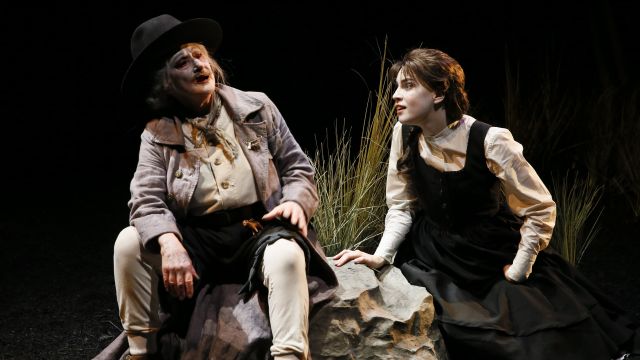Yentl
A marvellous, funny, moving, and very theatrical version of Isaac Bashevis Singer’s story. For many people, Yentl is a story made famous by Barbra Streisand’s 1983 movie – which, by the way, Bashevis Singer hated. That movie’s simpler feminist message, its pretence of the reconciliation of opposites, and the heroine’s escape to the holy land (i.e., America) was Streisand’s Hollywood version for her time.
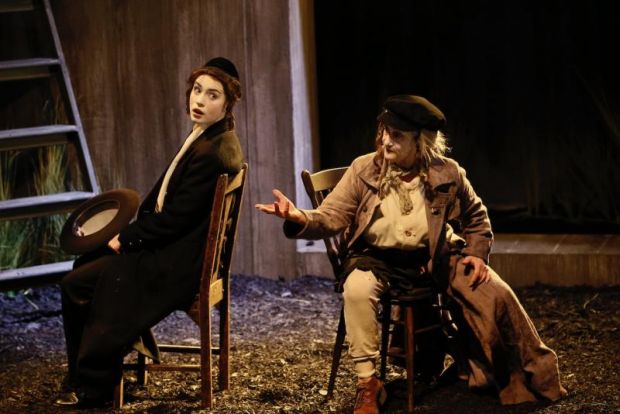
Here, adaptors Abrahams, Hearst and Klas have made a story for our time. Going back to the Yiddish original for their version, they have scarcely changed the plot. They have dramatized developments; they have expanded on details; they have added much delicious humour; and they have not ignored the elements of mysticism and spirituality. We are still in the shtetel, and it is still the story of the girl Yentl (Jana Zvedeniuk) who wants nothing more than to study the Torah and the Talmud. She disguises herself as the boy ‘Anshl’ so as to attend a yeshiva – a religious school. Already that’s a double sin. The very title of Bashevis Singer’s story – Yentl the Yeshiva Boy – is a tip-off: Yentl is a woman’s name; women are forbidden at the yeshiva. Yentl is a lawbreaker and an imposter. But her passion for the Torah goes beyond the intellectual: it is deeply part of her identity, her soul, her destiny. All the characters here are still subject to the rigid gender roles and the detailed Jewish laws that cover every aspect of life. And the story is still a story (ahead of its time) of cross gender love and gender fluidity.
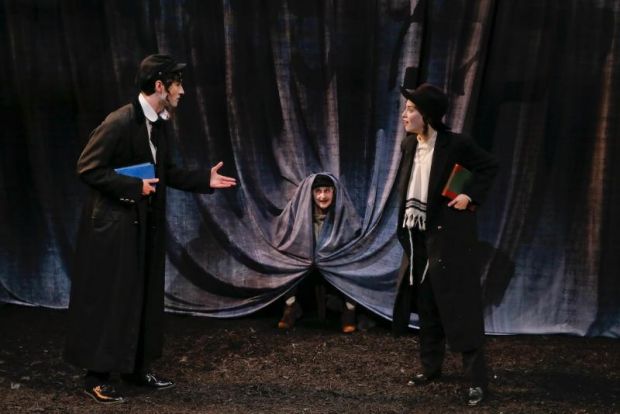
Dann Barber’s simple but suggestive set functions as every location the story needs, aided by Rachel Burke’s lighting that evokes constantly changing emotions. (Although I could have done without the huge curtain for scene transitions.) Barber has paid close attention also to the detail of male Jewish clothing so that we are reminded constantly of tradition and ritual – and of disguise and restriction.
In her search for a ‘quiet yeshiva’, Yentl leaves her village and meets Avigdor (Nicholas Jaquinot), another yeshiva student. She knows nothing of men, but now her pretence, her disguise begins in earnest. Were ‘Anshl’ a man, Avigdor would be the ideal companion and fellow scholar … Well, he is the ideal companion and fellow scholar – as long as he believes Anshl is a man. But Avigdor was engaged to Hodes (Genevieve Kingsford), the marriage was called off, and he is still desperately in love (or lust) with her…
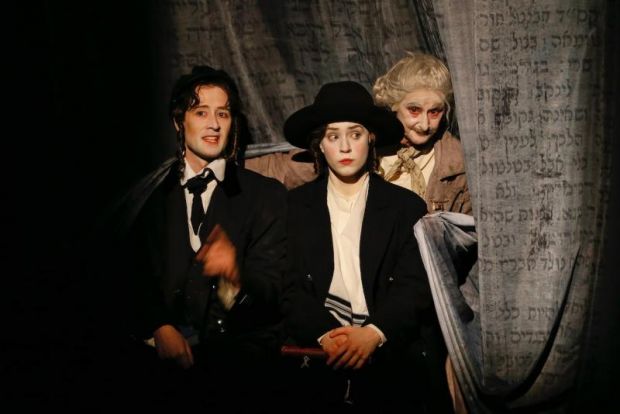
The successful 1975 stage play, by Leah Napolin and Bashevis Singer himself, had a cast of twenty. For this Yentl, there is a cast of only four and yet between them they create a community and dramatize the characters’ joys, confusions, and tribulations. There are references to characters we never see, but such is the quality of the writing and performance, those characters are vivid. Bashevis Singer’s narrator is matter of fact, objective, subtle and leaves us to make our own inferences. In this adaptation, we have the amazing Evelyn Krape (who initiated the project) as Yeytser Ho’re or The Evil Inclination. What is an ‘evil inclination’? It’s not necessarily bad – or good – it’s just human need, which may take you to unfortunate, or unlawful places – and it’s there in every human being. Krape zips about the stage, swishing her long coat, sometimes wearing ram’s horns. She climbs a ladder or onto a table, cackling as she disappears or watches on. Yentl/Anshl wonders if she – Yentl – might be an ‘imp’ or a ‘sprite’. Krape is both. She is the all-prescient Narrator, the Explainer (often in Yiddish, with surtitles), the Reminder of the Law (in Yiddish), and she becomes briefly, when necessary, other characters. She voices Yentl’s inner debates, she teases with a devilish, dirty laugh. At the start, she warns that God gave us free will, but we end up following a pre-ordained path anyway. ‘When you say A, you have to say B…’
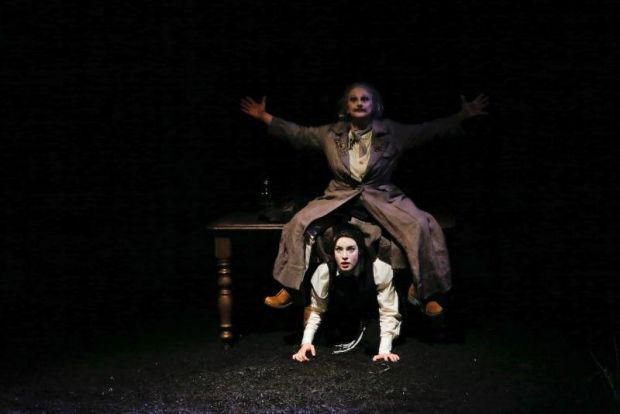
As usual with Gary Abraham’s masterful direction, we feel the characters on stage as conflicted, physical, flesh and blood beings. Genevieve Kingston is the beautiful, naïve, charmingly clumsy Hodes. In the story, Hodes is almost a functional character. But here, in Kingston’s performance, Hodes is fleshed out so that we feel her claustrophobic life, her loss of Avigdor, her confusion at her growing attraction to ‘Anshl, and her pain. Nicholas Jaquinot catches perfectly that quick, highly intelligent, spikey habit of Jewish disputation, but also Avigdor’s playful nature, his sadness, his anger, and the raging hormones and sexual frustration of a human being.
The revelation here, for me, is Jana Zvedenuik as Yentl/Anshl. There is not a single false note in the way she gives us Yentl’s journey – from determined but guilty girl in disguise, shy at first, but stubborn and growing in confidence. There is constant tension in her getting away with her deception, which for her is absolutely necessary. Zvedenuik makes it funny and touching to see the way Yentl’s impersonation of a bloke becomes more and more convincing even as she is more and more confused, apprehensive, and trapped, but always resolved. Finally, she is able to articulate her dual nature: she is a man in a woman’s body. How could this happen? Even God makes mistakes.
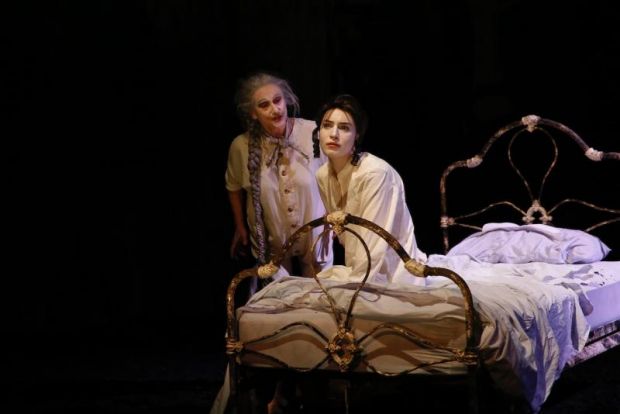
While giving full weight to Yiddish culture and Yentl’s devotion to Jewish learning and law, this production has a second if entwined and secular emphasis. And that is on finding one’s identity, sexual or otherwise, and having the courage to find and pursue that. With such a complex, layered story, there can be no simple resolutions, but this production gives us that complexity and those layers with delightful theatricality.
Michael Brindley
Photographer: Jeff Busby
Subscribe to our E-Newsletter, buy our latest print edition or find a Performing Arts book at Book Nook.

